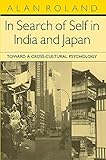In Search of Self in India and Japan : Toward a Cross-Cultural Psychology / Alan Roland.
Material type: TextPublisher: Princeton, NJ : Princeton University Press, [2021]Copyright date: ©1988Description: 1 online resource (424 p.)Content type:
TextPublisher: Princeton, NJ : Princeton University Press, [2021]Copyright date: ©1988Description: 1 online resource (424 p.)Content type: - 9780691228167
- PSYCHOLOGY / General
- Ajase complex
- Bhagavad Gita
- Bose, Girindrasakhar
- Christianity: in India
- Doi, Takeo
- Hassidic Judaism
- Ichimaru, Totoro
- Indian Psychoanalytic Society
- Jungian psychology
- Kiyoshi
- Meditation
- Naikon Therapy
- Positivism
- aggression
- amae psychology
- anandalakshmi
- ancestor worship
- anthrophobia
- applied psychoanalysis
- artistic creativity
- collective man
- confidentiality
- consciousness
- contexturalization
- contractual relationships
- culture of science
- deference
- detachment (in India)
- drive theory
- ego psychology
- endurance (Japanese)
- evolution
- folklore
- gender identity (Kiyoshi)
- gossiping (Indian)
- guru (paradigm)
- historical evolutionism
- identity conflicts: Ashis
- intrapsychic self
- karma
- life cycle (Indian)
- metapsychology
- mourning (Ashis)
- object-representation
- orality
- potentialities
- psychic determinism
- rationalism in psychoanalysis
- 155.2/0952
- online - DeGruyter
| Item type | Current library | Call number | URL | Status | Notes | Barcode | |
|---|---|---|---|---|---|---|---|
 eBook
eBook
|
Biblioteca "Angelicum" Pont. Univ. S.Tommaso d'Aquino Nuvola online | online - DeGruyter (Browse shelf(Opens below)) | Online access | Not for loan (Accesso limitato) | Accesso per gli utenti autorizzati / Access for authorized users | (dgr)9780691228167 |
Frontmatter -- CONTENTS -- PREFACE -- ONE. Introduction: The Familial Self, the Individualized Self, and the Spiritual Self -- PART ONE. The Indian and Japanese Self and Social Change -- TWO. Indian Identity and Colonialism -- THREE. Psychoanalysis in India and Japan -- FOUR. The Familial Self, Individualization, and the Modernization Process -- FIVE. The Dynamics of Change in Urban Indian and Japanese Women -- SIX. The Indian Self: Reflections in the Mirror of the American Life Style -- PART TWO. The Indian and Japanese Self: Theoretical Perspectives -- SEVEN. The Indian Familial Self in Its Social and Cultural Contexts -- EIGHT. The Indian and Japanese Familial Self -- NINE. The Spiritual Self: Continuity and Counterpoint to the Familial Self -- TEN. Conclusions: Psychoanalysis in Civilizational Perspective -- GLOSSARY -- REFERENCES -- INDEX
restricted access online access with authorization star
http://purl.org/coar/access_right/c_16ec
Drawing on work with Indian and Japanese patients, a prominent American psychoanalyst explores inner worlds that are markedly different from the Western psyche. A series of fascinating case studies illustrates Alan Roland's argument: the "familial self," rooted in the subtle emotional hierarchical relationships of the family and group, predominates in Indian and Japanese psyches and contrasts strongly with the Western "individualized self." In perceptive and sympathetic terms Roland describes the emotional problems that occur when Indians and Japanese encounter Western culture and the resulting successful integration of new patterns that he calls the "expanding self." Of particular interest are descriptions of the special problems of women in changing society and of the paradoxical relationship of the "spiritual self" of Indians and Japanese to the "familial self.? Also described is Roland's own response to the broadening of his emotional and intellectual horizons as he talked to patients and supervised therapists in India and Japan. "As we were coming in for a landing to Bombay," he writes, "the plane banked so sharply that when I supposedly looked down all I could see were the stars, while if I looked up, there were the lights of the city." This is the "world turned upside down" that he describes so eloquently in this book. What he has learned will fascinate those who wish to deepen their understanding of a different way of being.
Mode of access: Internet via World Wide Web.
In English.
Description based on online resource; title from PDF title page (publisher's Web site, viewed 27. Jan 2023)


